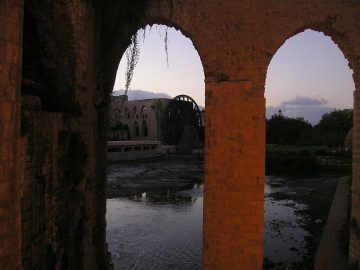Nour Malas in Guernica:
 Women in loose robes dragged toddlers, babies propped upon their hips. Men carrying parents and grandparents on their shoulders stepped ahead, calling back for assurances as women collapsed in the heat. Flimsy plastic bags, crammed with clothes and other belongings, dangled off shoulders and wrists. In the midday glaze, as light shimmered off the desert like water droplets, the scene at the Syrian-Iraqi border seemed almost biblical. My Iraqi colleague Ali, who had already tasted the wrath of displacement from his own country, squatted in the shade of our car and cried.
Women in loose robes dragged toddlers, babies propped upon their hips. Men carrying parents and grandparents on their shoulders stepped ahead, calling back for assurances as women collapsed in the heat. Flimsy plastic bags, crammed with clothes and other belongings, dangled off shoulders and wrists. In the midday glaze, as light shimmered off the desert like water droplets, the scene at the Syrian-Iraqi border seemed almost biblical. My Iraqi colleague Ali, who had already tasted the wrath of displacement from his own country, squatted in the shade of our car and cried.
I, too, had watched this scene many times already, in Syria and on its borders. Recently, at another crossing into Iraq, thousands of Syrians had trampled over a bridge that all but collapsed into a river, capturing the media’s waning attention of the then three-year-old refugee crisis. From Iraq, I went to Lebanon, Jordan, and Turkey, aiming to report on the refugee crisis from every border of Syria that I could. I was determined to see every dimension of this war so that I could better understand it. But not just for my reporting. This was a deeply personal assignment for me, and yet one that never quite felt personal enough.
Syria: never the country I called home, but certainly my homeland. I would untangle the many shades of this identity at the very moment the country was coming undone.
More here.
